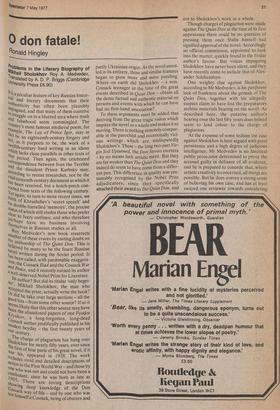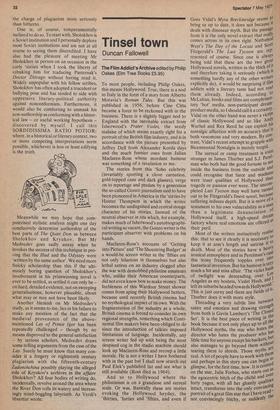o don fatale!
Ronald Hingley Problems in the Literary Biography of Sholokhov Roy A. Medvedev, Jh'ranslated by A. D. P. Briggs (Cambridge university Press £6.90) 1.t is a peculiar feature of key Russian historical and literary documents that their at has often been plausibly IMPugned, and that many of them contrive testruggle on in a blurred area where truth and falsehood seem commingled. The peci„untrY'S most famous medieval poem, for ;"aroPle, The Lay of Prince Igor, may in 'act be an eighteenth-century forgery and not, as it purports to be, the work of a twelfth -century bard writing in an idiom which lacks close parallels in other texts of that period. Then again, the celebrated cc:I-respondence between Ivan the Terrible
the dissident Prince Kurbsky may,
aecording to recent researches, not be the vi_ital sixteenth-century document as which it uas been received, but a hotch-potch conel?cted from texts of the following century. the.r again, to turn to more recent times, we h7ink of Khrushchev's 'secret speech' and doUble-barrelled 'memoirs', the precise -latUs of which still eludes those who prefer -*ear to fuzzy outlines; and who therefore pPh erha-s have no business involving ernselves in Russian studies at all. 11°Y Medvedev's new book resurrects tiother of these cruces by casting doubt on i authorship of The Quiet Don. This s elieved by many to be the finest Russian ,novel written during the Soviet period. It fil.as been called, with pardonable exaggerau°11, the Cossack Iliad and the Cossack War alld Peace, and it recently earned its author a well-deserved Nobel Prize for Literature. t I,ts author? But did its titular 'only begetat Mikhail Sholokhov, the man who aoccePted the prize, actually write the book?
did he take over large sections all the
Ood bits from some other source? If so it s,_eenis likely that this other source may have °Keen the abandoned papers of one Fyodor crYnkov, a long-forgotten, long-dead
ossack author prolifically published in his Modest heyday the first twenty years of our century.
The charge of plagiarism has hung over Tholokhov for nearly fifty years, ever since•the first of four parts of his great novel, if It wi as his, appeared in 1928. The work ocludes vivid and detailed descriptions of action in the First World War and those by c?ne who was not and could not have been a clombatant, since he was born as late as sh9°5: There are loving descriptions ewing deep knowledge of the Don _ ossa.ck way of life and by one who was not himself a Cossack, being of obscure and partly Ukrainian origin. As the novel unrolled in its entirety, these and similar features began to grow more and more puzzling. Where on earth did Sholokhov a nonCossack teenager at the time of the great events described in Quiet Don obtain all the dense factual and authentic material on persons and events with which he can have had no first-hand association? To these arguments must be added that deriving from the great tragic vision which inspires the novel as a whole and makes it so moving. There is nothing remotely comparable in the parochial and occasionally vicious writings which are undisputedly Sholokhov's. These the long two-part Virgin Soil Upturned, the Don Stories etcetera by no means lack artistic merit. But they are far weaker than The Quiet Don and they indeed do seem to have come from a different pen. This difference in quality was presumably recognised by the 'Nobel Prize adjudicators, since they specifically attached their award to The Quiet Don, and
not to Sholokhov's work as a whole. Though charges of plagiarism were made
against The Quiet Don at the time of its first appearance there could be no question of pressing them once Stalin himself had signified approval of the novel. Accordingly an official, commission, appointed to look into the matter, quickly found in the titular author's favour. But voices impugning Sholokhov have never been silent, and they have recently come to include that of Alexander Solzhenitsyn.
One weighty clue against Sholokhov,
according to Mr Medvedev, is his persistent lack of frankness about the genesis of The Quiet Don, together with his allegedly suspect claim to have lost the preparatory archive materials bearing on the novel. As described here, the putative author's bearing over the last fifty years does indeed seem to lend colour to the charge of plagiarism.
At the expense of some tedium the case against Sholokhov is here argued with great persistence and a high degree of judicious intelligence. Mr Medvedev is no fanatical public prosecutor determined to prove the accused guilty in defiance of all evidence, and he is prepared to concede that, where artistic creativity is concerned, all things are possible. But he does convey a strong sense of believing his own case, and has at least swayed one reviewer towards considering the charge of plagiarism more seriously than hitherto.
One is, of course, temperamentally inclined to do so. To start with, Sholokhov is a Soviet institution and I personally deplore most Soviet institutions and am not at all averse to seeing them discredited. I have also had the pleasure of meeting Mr Sholokhov in person on an occasion in the early 'sixties when I took the liberty of rebuking him for traducing Pasternak's Doctor Zhivago without having read it. Widely unpopular with his fellow scribes, Shcilokhov has often adopted a truculent or bullying pose and has tended to side with oppressive literary-political authority against nonconformists. Furthermore, it would also be comforting to unmask his non-authorship as conforming with a historical law — or useful working hypothesis — discovered by myself. I call this SORDIDISSIMA RATIO POTIOR: where, in a historical or literary context, two or more competing interpretations seem possible, whichever is less or least edifying is the truth.
Meanwhile we may hope that computerised stylistic analysis might one day conclusively determine authorship of the best parts of The Quiet Don as between Sholokhov and Kryukov. But Mr Medvedev goes sadly astray when he invokes the success of this technique in proving that the Iliad and the Odyssey were 'written by the same author'. We need more finicky scholarship than this if the ultimately boring question of Sholokhov's involvement in his prizewinning novel is ever to be settled, as settled it can only be — on hard, detailed evidence, not on sweeping generalisations, however plausible, about what may or may not have been likely.
Another blemish on Mr Medvedev's study, as it seems to me, lies in his failure to make any mention of the fact that the medieval provenance of the abovementioned Lay of Prince Igor has been repeatedly challenged — though by no means disproved to the general satisfaction — by serious scholars. Medvedev draws some telling arguments from the case of the Lay. Surely he must know that many consider it a forgery or eighteenth century plagiarism with the fifteenth-century Zadonshchina possibly playing the alleged role of Kryukov's archives in the affaire Sholokhov? All four bodies of writing do, incidentally, revolve around the area where the River Don rolls its watery and increasingly mind-boggling labyrinth. As Verdi's librettist wrote:







































 Previous page
Previous page